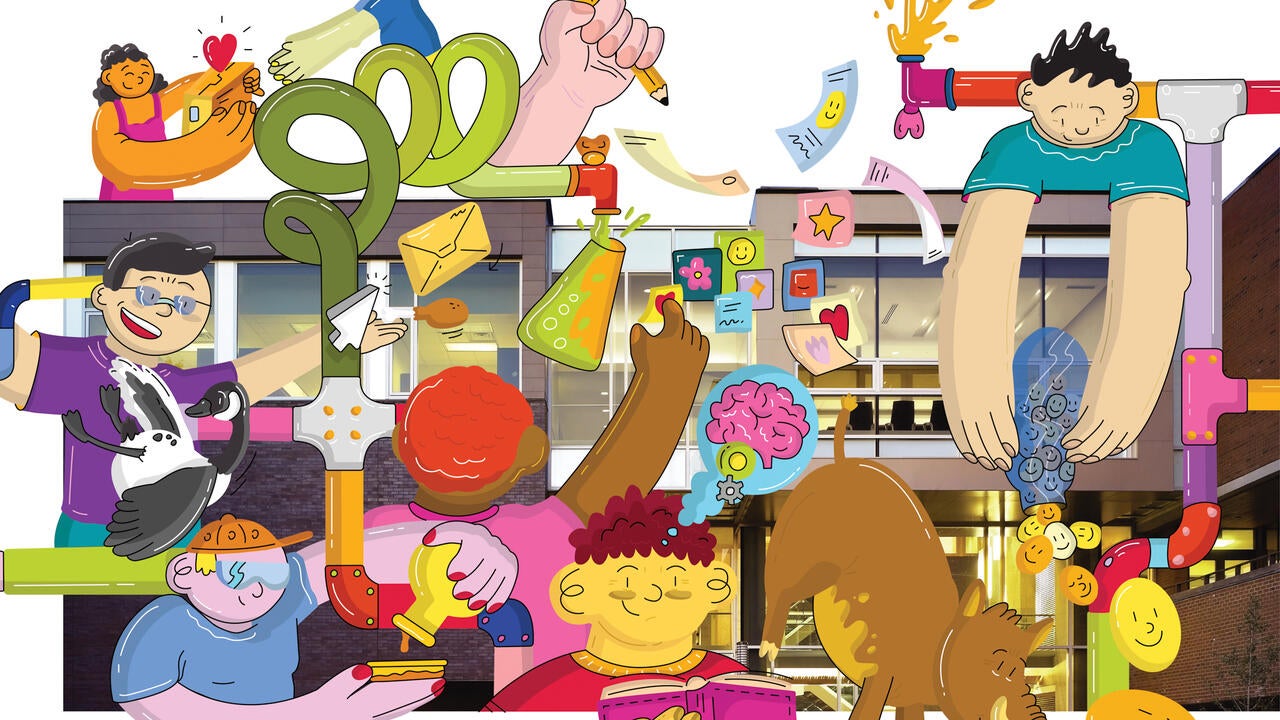
The science of happiness
First-year students hone more than their research skills by exploring what it means to be happy

First-year students hone more than their research skills by exploring what it means to be happy
By Wendy Philpott Waterloo MagazineWhat is happiness, and why do we strive for it? Can we become happier? Should we? Is happiness a good thing?

Dr. Megan McCarthy (PhD ’16)
“ARTS 140 is really focused on becoming critical consumers of information and learning how to organize evidence to make a compelling argument,” McCarthy said.
McCarthy designed the course to challenge students to think about their beliefs and understanding of happiness, research and test various perspectives on happiness and critically evaluate claims about it.
But can students — or anyone — separate their personal and intuitive feelings about happiness to examine it critically?
“I first ask the students to try to write their own definition of happiness,” McCarthy said. “And then they look at different definitions over different eras, fields and in different parts of the world. I get them to reflect on how their definition compares to other conceptions. And then we talk about the roles of empiricism, critical thinking and how looking at data can shape our understanding.”
Having taught the course every term since 2021, McCarthy has found that, because students often come from different backgrounds, they engage in rich comparative discussions with classmates about their own beliefs and how their experiences led to those beliefs. Through these interactions, the students become “much more accepting of different ways of looking at the subject because they're exposed to different experiences. And they have a lot of fun.”
I've had students talk to me about how the course has transformed their personal lives.
As a practice-based course, the students are encouraged to test happiness-boosting claims and then reflect, discuss and evaluate them. In their main project, they even developed their own methods to increase happiness in the community, drawing from their primary research sources and interpretation of evidence.
Student happiness projects included cooking dinner with their family to increase bonding, making and delivering care packages for unhoused people in the area and organizing a sharing circle in their university residence to reduce stress and enhance social connections.
One student designed a happiness plan for their workplace after noticing employees weren’t working effectively as a team. They developed a method to strengthen the co-worker community and improve well-being. The student reported that their manager was planning to implement the changes in the workplace in the future.
“I've had students tell me that the assignments have made them fall in love with research,” McCarthy said. “They get really excited about the process — how to come up with a research question, collect the data and think critically about it.”
McCarthy sets specific learning outcomes for the course, which include being able to reflect critically on their own cultural experiences that shape how they feel. “I think that one is important because that can be applied across disciplines where they're learning to engage with the ideas and beliefs of others and understand their own assumptions. And I think that can support good relationships and community.”
Becoming a better researcher is not the only positive outcome of the course. “I hear about it impacting emotional or social well-being,” McCarthy reflected. “I've had students talk to me about how the course has transformed their personal lives. That it has made them happier people, that it has made them think differently about the way they're engaging with and relating to other people. And that's tremendously powerful for me.”

Read more
Floyd Marinescu launched UBI Works to reframe the debate about basic income — and his message is catching on

Read more
World-class researchers shape new ways to foster happiness and personal well-being

Read more
Zain Bandali publishes an early-reader chapter book that explores gender norms and sense of belonging in a community
The University of Waterloo acknowledges that much of our work takes place on the traditional territory of the Neutral, Anishinaabeg, and Haudenosaunee peoples. Our main campus is situated on the Haldimand Tract, the land granted to the Six Nations that includes six miles on each side of the Grand River. Our active work toward reconciliation takes place across our campuses through research, learning, teaching, and community building, and is co-ordinated within the Office of Indigenous Relations.